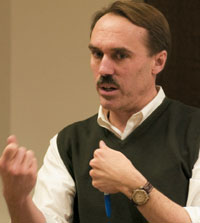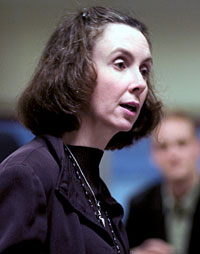A
world of ideas
The Kellogg School's international curriculum
prepares students for the challenges of the global market — wherever
their professional journey may take them
By
Rebecca Lindell
| |
 |
| |
© Nathan Mandell
Prof. Mark Finn finds a world of difference in accounting practices from
country to country.
|
| |
|
| |
|
| |
|
When Tapiwa Mashingaidze
'04 was deciding where he would gain the best preparation for a global business
career, he quickly narrowed his sights on the Kellogg School.
Mashingaidze saw that Kellogg was one of the few schools
targeted for recruitment by the International Finance Corp.,
the World Bank arm that promotes sustainable private-sector
development.
"It suggested to me that Kellogg had an international perspective,
and particularly a perspective geared toward developing countries," says
the Zimbabwean native, who plans to work in emerging markets. That
fact, combined with the school's "vibrant personality" and
location in Evanston, directly adjacent to Chicago, a city
he found intriguing, made the business-school choice an easy
one.
Mashingaidze
hasn't been disappointed. In addition to studying
a host of international issues, he has helped found the Kellogg
Emerging
Markets Club and served on a task force to enhance
the school�s global curriculum.
He
also has met many Kellogg alumni working in emerging
markets, including a mentor who is "guiding me in all sorts
of directions I wouldn�t previously have considered." "I've
been extremely satisfied with my decision," says
Mashingaidze, who worked in investment banking in the United
Kingdom prior to enrolling at Kellogg. Mashingaidze is not alone. Whether or not they are seeking
global business careers, most Kellogg School students today
graduate with a portfolio of international management and
leadership skills. A global spirit infuses almost every corner
of the school, from conferences and research to coursework
and extracurricular activities. Much of that energy flows directly from the Kellogg student
body. One out of every three students hails from overseas.
Half of their American classmates have lived abroad for three
months or more. Many students have worked for multinational
companies and understand firsthand the importance of operating
in the global arena. Nearly
three years ago, Kellogg pulled together its many international
offerings under the banner of the International
Business and Markets Program. Chaired by Professor Daniel
Spulber, the program represents the school's efforts to organize
its global curriculum around its traditional academic disciplines.
Doing so allows Kellogg to offer a full slate of courses
on international economics, finance, management, accounting
and marketing. Just as important, it satisfies a demand that
students have been increasingly expressing for the past several
years. "We heard what they were telling us, and we followed their
interests," says Spulber, the Elinor Hobbs Distinguished
Professor of International Business. "World
events have contributed to our international focus. The
World Trade Organization has come to the fore, and there's
a greater interest in international trade," Spulber adds. "But
I think Kellogg students have long had an international dimension,
and itís their interest thatís gotten everything going." The heart of the program is the International
Business major. Its core course, International Business Strategy,
covers topics such as strategic alliances, importing and
exporting, and foreign direct investment. The course has
proven so popular that Kellogg will add a sixth section next
year to meet student demand.
In addition to the core course, International Business
majors must take three electives. Offerings include the perennially
popular Global Initiatives in Management program,
better known as GIM. The course offers students the chance
to research international business issues overseas during
a focused research trip to one of roughly 15 countries.
The most popular destination is China, whose fast-growing
population and economy are being closely watched by students
and faculty alike. In fact, research on China by Kellogg
School students will soon find a wider audience through a
book, Kellogg on China, to be published next year
by the Northwestern University Press.
"The students in the GIM program tend to pick up on issues
that are very topical, and a lot of their projects have focused
on how companies are dealing with things like marketing,
entry strategy and copyright piracy," says Anuradha
Dayal-Gulati,
editor of the book and faculty adviser for the China GIM
program. "There's not a lot of recent research on China
out there, so weíve taken the best of the student projects
and put them into this book."
Initiatives such as this illustrate the value Kellogg places
on student input, particularly when it comes to enhancing
its international programs. This year, the school is rolling
out several new global business classes. The offerings are
a response to student demand for more focused international
coursework, says Mashingaidze, the student representative
on the committee convened by Dean Dipak
C. Jain to study
the issue.
The spring 2004 quarter, for example, will mark the introduction
of International Business Strategy in Nonmarket Environments.
The new class will address topical issues such as the role
of the International Monetary Fund in developing nations
and corruption in emerging markets.
"In
the past, students have said, 'I don't need any international
coursework because I won't be doing international work,'" Mashingaidze
says. "Increasingly, that's not going to be possible. "Microsoft, for example, sells in every country of the
world, as do Kraft and Procter & Gamble. Everything will
be to some extent international, and there will be a demand
for us to respond to that as an institution." The
Kellogg faculty is up to the task. Bolstered by the school's
International
Business and Markets Research Center, Kellogg
professors are undertaking cutting-edge research
into a broad range of global issues. "Our bench strength
is fantastic," Spulber says.
Below,
a few Kellogg School professors share a sampling of the issues
under exploration.
Accounting
models in the global arena
Mark
Finn, clinical associate professor of accounting and international
business, is fascinated by the different ways companies around
the world approach their accounting statements.
In
the United States, for example, companies are generally
reluctant to disclose information that could cast their businesses
in a negative light or subject them to legal liability. But
that's not always the case overseas. Increasingly, companies doing business in emerging markets
are releasing all sorts of information about their impact
on the environment, the composition of their work force,
and other social concerns. "In
the United States, you can get a lot of this data from
the government, but it's not produced in a way that's easily
consumable by stakeholders," Finn notes. "In many
other countries, companies really feel compelled to report
to all stakeholders
the social projects they have underway." In
some countries, these disclosures are required. In others,
these "sustainability reports" are simply regarded
as a good business practice. "I think it is related to a whole set of concerns regarding
globalization and the social role of internationals," Finn
says.
"Thereís
a demand by investors for this information, because they
are concerned about the future of their investments.
Also, there's pressure fromvarious stakeholders — employees,
unions, the governments of countries in which these companies
operate. And now there are increasingly prominent mutual
funds specializing in 'green' companies. For them, these
disclosures are very helpful." Finn
is investigating the factors that motivate companies
in emerging markets to make these disclosures. One possible
reason is a desire to allay the local citizenry's concerns
about exploitation and environmental degradation. Some of
the most proactive firms in this regard include multinational
mining companies in South Africa, where concerns about responsible
economic growth have emerged in tandem with that country's
transition to black majority rule. Many of these companies
are eager to be seen as willing participants in the transition
to a new social democracy, Finn notes, and their openness
can help make their case. "Their disclosures on social metrics will certainly be
seen as important, because of the political pressure to restructure
the big corporations that were prominent under apartheid," Finn
says.
Finn,
who teaches courses on international and advanced accounting
at Kellogg and serves as director of the GIM program,
is also investigating how certain industries in other nations — particularly
technology companies in India — account for intangible assets
in their reports. Their more aggressive approach clashes
with methods used in the United States, and Finn is interested
in how the two compare. "The international arena is a richer place to study these
things," Finn says. "Various non-stockholder groups
are more active; companies are facing different pressures
to provide
more information. There are a lot of politics involved, and
that has a very interesting impact on accounting models."
Analyzing compensation across borders
Companies
moving sales managers overseas can find themselves in a
quandary.
The managers
expect — and deserve — additional compensation
for their relocation and new responsibilities. But the extra
pay and perks can be grossly out of scale to those received
by managers from the local labor force. So how are companies
to reward their managers, without seeming insensitive to local
norms?
 |
|
© Nathan Mandell
Prof. Anne Coughlan studies cross-cultural compensation.
|
|
| |
|
That is
a question Anne
Coughlan, associate professor of marketing, is exploring
in a broader research project on international differences
in sales force compensation.
"Companies care a lot about these issues," Coughlan says. "If
you're not sensitive, you'll create the wrong incentives." Ample
research exists on the topic on a country-by-country
basis. But Coughlan's project is venturing into uncharted
territory, in part because it has proven so difficult to
compare compensation packages between countries. Certain
incentives are valued more highly in some countries than
in others, and differing tax systems can distort the relative
differences in pay. Coughlan and her co-authors are analyzing the compensation
of 14,000 salespeople and 4,000 managers in France, the United
Kingdom, Germany and the Netherlands. Her co-researchers include Erin Anderson of INSEAD and
Dominique Rouzies of HEC, both in France. The team is being
aided by an international consulting firm, which is providing
standardized data on salaries, commissions, perquisites,
health plans and other non-compensation benefits. The numbers take into account many other factors affecting
the status of each worker, including seniority, job difficulty,
the size of the company, and the degree of risk he or she
handles. "There's
a feeling that to motivate excellence, a greater proportion
of a workerís pay should be based on commission," Coughlan
says. "Here we're seeing that's not enough. The tax
regimes in these countries differ significantly. Some countries
have
much more progressive tax rates and much more draconian tax
structures. In some cases, even though some people may be
paid more highly, their total income will drop. "If
you're an international company, you need to look at
these differences
country-to-country, because they will have
a vast effect on how you want to pay." Even if companies are not moving many workers across borders,
they still need to understand incentive issues in local markets,
Coughlan adds. "In
the United Kingdom, for example, it's very, very important
to give someone a car," she says. "The higher in
the organization you rise, the better the car. That has a
lot of meaning in
the U.K. "But
in the Netherlands, vacation matters. People are always
talking about the amount of vacation they are getting, not
their gross pay level." Yet Coughlan warns against drawing simple conclusions from
such observations. "I'm
pretty skeptical about cultural arguments that the Brits
are about cars and the Dutch are about vacations," she
says. "When you tease apart the tax structure, you understand
it much better."
The
impact of institutions on trade
One
country sets complex standards for many of its products, forcing
producers to adapt to its markets. Another has a legal system
renowned for its integrity and efficiency.
 |
|
© Nathan Mandell
Prof. Johannes Moenius analyses how national institutions
impact trade. |
|
| |
|
What do
these have to do with a nation's success as a trading partner?
A great deal, according to Johannes Moenius, assistant
professor of management and strategy.
"The
quality of a country's institutions has a compositional
affect on its trade," he says. "It will spur exports
in more complex areas." Moenius
analyzes the ways a nation's institutions impact
its trade. Institutions, in this case, include product standards,
as well as domestic institutions such as the legal system. "They
are part of the technical infrastructure of the society," he
explains, "and they promote competition because they
tell exactly what you have to produce." Markets in nations
without well-written standards will be harder to penetrate — and
will see less competition as a result. Markets
with ample product standards and well-functioning legal
systems increase competition and draw more trading
partners, Moenius notes. "If your product lines depend
on on-time delivery, you can't go for an unreliable partner," he
says. "Having good institutions in a country will make
that country a more attractive trading partner because you
can
go in there and get your money back." Countries whose institutions operate at a high level tend
to export more complicated products, such as automobiles
and technology goods, Moenius says. Countries with less effective
institutions usually export simpler products, such as food
and raw materials. Smaller companies seeking to enter emerging markets with
poorly developed institutions will find themselves at a particular
disadvantage, Moenius says. "With
good-quality institutions, you can rely on the labor
market supply. But in other countries, you have to develop
that from scratch. You find more big conglomerates in countries
with less-developed institutions because they have to do
everything in-house. They have to be big to attract capital
and develop their international labor market." The
Kellogg professors' observations are of particular
interest to those who seek to promote trade in emerging markets.
"Policy
makers have an influence on the quality of their institutions,"
Moenius says. "You can talk to their governments about
improving them. You can't change the types of products produced
in a country, while the quality of the institutions is the
government's choice. It's a variable."
 |
|
© Nathan Mandell
Currency markets are part of Prof. Sergio Rebeloís academic
interests. |
|
| |
|
Making
sense of currency devaluations
Sergio
Rebelo, the Tokai Bank Distinguished Professor of International
Finance, keeps a close eye on the currency markets. Understanding
the dynamics surrounding them — and how they affect
local markets — is a prime focus of his research.
Among his findings: that not all prices are affected equally
when the value of the local currency plummets.
Conventional thinking says that the rate of inflation coincides
with the rate of currency depreciation. Many exchange-rate
models rely on this concept, which is also used in valuation
exercises and by companies as they decide how to set prices.
But this prediction is often "terribly off the mark," Rebelo
says. For example, he notes that when the Korean currency
depreciated by roughly 40 percent between October 1997 and
October 1998, inflation during the subsequent year was only
7 percent.
This and other discrepancies set Rebelo and his co-researchers
on a quest to determine a better way to predict the impact
of currency devaluations on the rate of inflation. Their
study led them to go beyond conventional data sources, such
as the Consumer Price Index, to gain a more accurate view
of price behavior during the currency crises of the past
decade. Episodes studied include the devaluations in Mexico
in 1994, Asia in 1997, Brazil in 1999 and Argentina and Turkey
in 2001.
Among Rebelo's discoveries: that the prices
of various goods move in predictable patterns after devaluations,
depending on their position in the market.
Goods produced solely for local consumption — housing,
education, health and transportation — seem least
affected by currency devaluations.
That hasn't proven true for imports and
exports at the dock, whose prices often reflect the impact
of exchange
rate fluctuations. But in retail stores, the prices of these
goods
tend to be more stable. Local distribution costs, such
as labor, real estate and transportation services, can account
for up to 50 percent of the price of the typical consumer
good.
These costs tend to stabilize retail prices, even when
currency values are swinging, Rebelo says.
In addition to his work on devaluations and inflation,
Rebelo investigates the causes of business cycles, the effects
of economic policy on economic growth, and the causes and
consequences of currency crises. His findings yield important
insights for managers operating in an increasingly global
economy.
"Companies are fragmenting production all over the world," Rebelo
says. "It's important to understand the international
business environment, the behavior of exchange rates, and
how to protect
yourself from exchange-rate fluctuations."
Finn, Coughlan, Moenius and Rebelo are just a few of the
Kellogg School professors exploring international business
issues. Scores of their Kellogg colleagues are also breaking
new ground as they seek to answer questions raised by the
global economy.
For the Kellogg students charting careers
that will take them around the world and home again, this
faculty research serves as a beacon into the future.
|



